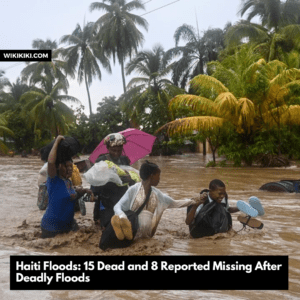Haiti heavy rains have caused widespread flooding and landslides, resulting in the death of at least 15 people and leaving another eight missing. Approximately 13,400 people have been forced to evacuate their homes, and more than 7,400 families have reported damage. The floods have also caused significant damage to crops in Haiti’s central region, exacerbating the already dire situation of hunger in the country.
Prime Minister Ariel Henry has stated that he is working with local and international organizations to provide assistance to those affected by the floods. The situation is further compounded by the ongoing challenges Haiti faces, including violence and a fragile infrastructure. It’s a tragic event, and I hope that the necessary aid and support reach the affected communities swiftly.
Also Read: Chicago Shooting: 1 killed, 7 shot in Austin neighborhood

Haiti is grappling with numerous challenges, has been struck by a calamity of nature once again. Heavy rains have unleashed devastating floods and landslides, resulting in the loss of lives and displacement of thousands of people. The torrential downpours have led to the death of at least 15 individuals, with eight more reported missing. The situation is dire, with nearly 13,400 people forced to evacuate their homes and seek shelter elsewhere.
The floods have caused extensive damage to infrastructure, homes, and crops. This catastrophe comes at a time when Haiti is already facing severe hunger, violence, and a fragile economy. Urgent action is needed to support the affected communities and provide the necessary aid to alleviate their suffering.
Haiti has long been prone to natural disasters, including hurricanes, earthquakes, and floods. Its geographical location and environmental factors make it susceptible to these catastrophic events. The country’s mountainous terrain, deforestation, and inadequate infrastructure contribute to its vulnerability.
Haiti’s history is marred by devastating natural disasters. The earthquake in 2010, for instance, claimed the lives of approximately 230,000 people and caused widespread destruction. Since then, the country has been struggling to recover and build resilience against future disasters. However, the recent floods have once again highlighted the ongoing challenges faced by Haiti and its people.
Also Read: Utah School District Bans Bible for ‘Vulgarity and Violence’
Heavy Rains and Flooding
The heavy rains that lashed Haiti over the weekend unleashed widespread flooding and landslides across the country. The torrential downpours transformed streets into raging rivers, engulfing homes and displacing thousands of people. The Civil Protection Agency reported that nearly 13,400 individuals were forced to evacuate their residences, seeking safety and shelter in temporary accommodations.
The death toll currently stands at 15, with eight individuals still missing. The loss of lives is deeply tragic and a stark reminder of the vulnerability of the Haitian population in the face of natural disasters. Families have been torn apart, communities devastated, and the country once again thrust into a state of mourning.
The floods have also caused significant damage to infrastructure, including roads, bridges, and houses. Many homes have been destroyed, leaving families homeless and vulnerable. Moreover, the flooding has taken a toll on Haiti’s agricultural sector, with crops in the central region severely impacted. This poses a grave threat to food security, exacerbating the already dire hunger crisis in the country.
International Aid
The international community has expressed solidarity with Haiti and pledged assistance. Humanitarian organizations, including the United Nations and various non-governmental organizations, have mobilized resources and expertise to support the relief efforts. Immediate financial assistance, emergency supplies, and expertise in disaster management and logistics are being provided to aid the affected communities.
Neighboring countries and regional organizations have offered their support. The Caribbean Community (CARICOM) and its member states have extended their assistance, coordinating efforts to provide aid and contribute to the recovery process. This regional collaboration is vital in the face of shared vulnerabilities and the need for collective action.
Also Read: Senegal Violence: Deadly Clashes in Following Opposition Leader’s Sentencing
Building long-term resilience is equally important. Haiti needs sustained support and investment to enhance its infrastructure, strengthen disaster preparedness measures, and promote sustainable development practices. This includes initiatives to address deforestation, improve drainage systems, and invest in early warning systems and emergency response capabilities.
Efforts must be made to address the underlying social and economic challenges that exacerbate the impact of disasters. This includes addressing poverty, improving access to education and healthcare, and promoting sustainable livelihoods. By tackling these broader issues, Haiti can better withstand future disasters and reduce the devastating consequences on its population.
The recent floods in Haiti have once again exposed the vulnerability of the nation and its people to natural disasters. The loss of lives, displacement of thousands, and damage to infrastructure and crops underline the urgent need for immediate relief and long-term resilience-building efforts. The challenges faced by Haiti in responding to this crisis are manifold, including limited resources, fragile infrastructure, ongoing violence, and political instability.
International support and collaboration are crucial in providing the necessary aid and expertise to alleviate the suffering of the affected communities. However, sustained efforts are needed to address the underlying issues and build resilience against future disasters. By investing in infrastructure, disaster preparedness, and social development, Haiti can take significant steps towards mitigating the impact of natural disasters and safeguarding the lives and livelihoods of its people. The international community must stand in solidarity with Haiti and support its recovery and reconstruction efforts, ensuring that no one is left behind in the face of such calamities.
Also Read: 6.2-Magnitude Earthquake Strikes New Zealand’s Auckland Islands

















+ There are no comments
Add yours